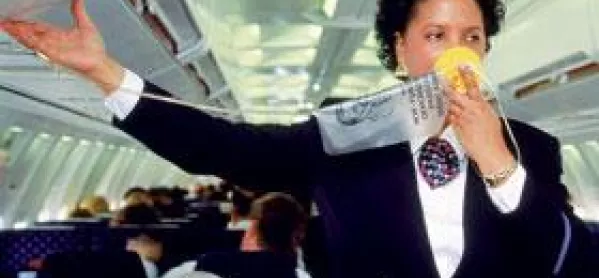Soaring success of cabin crew course

With its opportunities for international travel, plus obligatory high heels and lipstick, the job of the “trolley dolly” or air hostess has long been regarded as a glamorous career choice.
The threat of international terrorism and advent of no-frills travel have served to make the lives of modern cabin crew far less glitzy. But at City of Glasgow College, which has received 353 applications for up to 23 places on its unique airline cabin crew training course, it seems that working at 35,000ft is as attractive as ever.
In fact, the college’s City amp; Guilds Diploma in air cabin crew and ground operations is one of its most popular. The course covers health, security and emergency procedures, while offering an introduction to aviation operations.
Students also get to hone their skills in the college’s own simulated aeroplane cabin, which allows them to practise safety demonstrations, making announcements and serving food and drink in an authentic setting.
“Our unique resource, CityAir, which comprises a mock airline cabin and purpose-built airline check-in desks, is used for the delivery of this programme and enhances the student experience by providing a realistic environment for students to practise in,” said Gail Morrison, head of the college’s tourism department.
Languages, essential on international flights, are part of the course, with students required to study German, Spanish and French. And experts from other college departments also play their part: hairdressing and beauty students give advice on hairstyling techniques and make-up, while trainees from the food and hospitality department supply meals to be served in the simulated cabin and help cabin crew students to perfect their waitressing technique.
“Employment opportunities are growing in the airline and airport sectors,” Ms Morrison said. “However, the recruitment process is rigorous and highly competitive, and successful candidates require the essential skills, qualities and attitude. This course addresses those needs.”
Ms Morrison said that many of last year’s graduates had already received job offers, and that one of this year’s students had left the course after securing a role with British Airways.
“The programme has enhanced the learners’ employment opportunities as they have gained a range of skills and knowledge: confidence-building skills, citizenship skills, language skills and research skills,” she said.
“Furthermore, they have participated in a number of challenging practical activities: life-saving in a local pool, public address safety announcements and fire drill activities. The students are also required to dress in uniform and this has promoted the importance of personal presentation.”
Laura Miller, 21, from East Ayrshire, is looking forward to the remaining months of her course, despite already having a job offer from Ryanair. “I have always wanted a career as cabin crew,” she said. “The course has been absolutely fantastic.
“We learn Spanish, German, French, and all the health and safety and security we will need. Everything we need to learn, we learn here. The course shows the airlines that we have a good understanding of the industry already.”
Ms Miller added that learning in the simulated cabin was “amazing”, saying that it felt just like being on a real plane.
Ms Morrison said that although places on the course were limited owing to the size of the cabin, the college hoped to expand once the department moved into its new building in 2016.
The course is part of a wider trend in colleges to increase students’ future employability. At North East Scotland College in Aberdeenshire, for example, courses tailored towards preparing young people for jobs in the oil and gas industry are also proving popular.
Keep reading for just £1 per month
You've reached your limit of free articles this month. Subscribe for £1 per month for three months and get:
- Unlimited access to all Tes magazine content
- Exclusive subscriber-only stories
- Award-winning email newsletters



